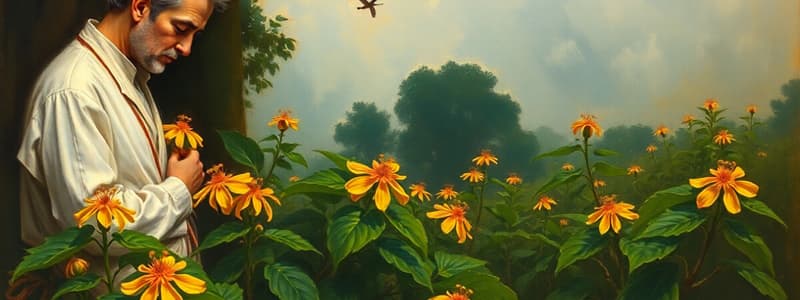Podcast
Questions and Answers
Tu Youyou discovered ______, a crucial antimalarial drug.
Tu Youyou discovered ______, a crucial antimalarial drug.
artemisinin
Tu Youyou was awarded the Nobel Prize in ______ for her contributions to malaria research.
Tu Youyou was awarded the Nobel Prize in ______ for her contributions to malaria research.
2015
Tu Youyou's team was part of a government initiative called ______ aimed at discovering new antimalarial drugs.
Tu Youyou's team was part of a government initiative called ______ aimed at discovering new antimalarial drugs.
Project 523
Tu Youyou's early research included studying schistosomiasis and ______ diseases.
Tu Youyou's early research included studying schistosomiasis and ______ diseases.
Her research on ______ medicines took place on Hainan Island.
Her research on ______ medicines took place on Hainan Island.
Tu Youyou isolated ______, which became the main malaria treatment worldwide.
Tu Youyou isolated ______, which became the main malaria treatment worldwide.
At the age of 39, Tu Youyou led a team to discover a new ______.
At the age of 39, Tu Youyou led a team to discover a new ______.
Tu Youyou contracted ______ at age 19, which inspired her to research medicines.
Tu Youyou contracted ______ at age 19, which inspired her to research medicines.
Tu Youyou studied traditional Chinese medicine and gathered over ______ traditional drugs during Project 523.
Tu Youyou studied traditional Chinese medicine and gathered over ______ traditional drugs during Project 523.
Tu Youyou was born in ______, located on China's east coast.
Tu Youyou was born in ______, located on China's east coast.
The World Health Organization Collaborating Centre for Traditional Medicine is located at the China Academy of Traditional Chinese Medicine in ______.
The World Health Organization Collaborating Centre for Traditional Medicine is located at the China Academy of Traditional Chinese Medicine in ______.
Tu Youyou earned a Nobel Prize in ______ for her work in pharmacology.
Tu Youyou earned a Nobel Prize in ______ for her work in pharmacology.
After studying schistosomiasis, Tu Youyou joined the Academy of Traditional Chinese Medicine in ______.
After studying schistosomiasis, Tu Youyou joined the Academy of Traditional Chinese Medicine in ______.
Study Notes
Tu Youyou: Pioneer in Malaria Research
- Chinese pharmacologist who discovered artemisinin, a crucial antimalarial drug.
- Won the 2015 Nobel Prize in Physiology or Medicine for her work.
Key Achievements
- Isolated artemisinin: This compound became a worldwide treatment for malaria.
- Inspired by ancient knowledge: Used a 1,600-year-old recipe to develop an effective method for extracting artemisinin.
- Early research in schistosomiasis: Studied this parasitic disease, gaining valuable insights into parasite-related illnesses.
- Led a research team (1969): Dedicated to finding new antimalarials during the "Project 523" initiative.
Background
- Born in Ningbo, China: Tu was born on China's east coast.
- Interrupted education by tuberculosis (TB): She later studied pharmacology at Peking University.
- Rooted in traditional Chinese Medicine (TCM): Her experience and training in TCM provided crucial insight and knowledge for her research.
- **Project 523: **Part of a government initiative to discover new antimalarial drugs.
- Collected traditional Chinese medicines: Tu and her team gathered over 2,000 traditional medicines within just three months.
Malaria Research Context
- Widespread malaria crisis: Malaria rates were rising during the 1960s, and existing treatments were ineffective due to parasite resistance.
- Urgent need for new treatments: Death rates rose due to increasing drug resistance, emphasizing the urgent need for new therapeutic approaches.
- Focused research on Hainan Island: Her team concentrated on traditional medicines on Hainan Island as part of "Project 523" to find effective remedies.
Studying That Suits You
Use AI to generate personalized quizzes and flashcards to suit your learning preferences.
Description
Explore the groundbreaking contributions of Tu Youyou, the Chinese pharmacologist who discovered artemisinin, a vital antimalarial drug. Learn about her Nobel Prize-winning work, her unique approach combining traditional Chinese Medicine with modern science, and her pivotal role in combating malaria.





